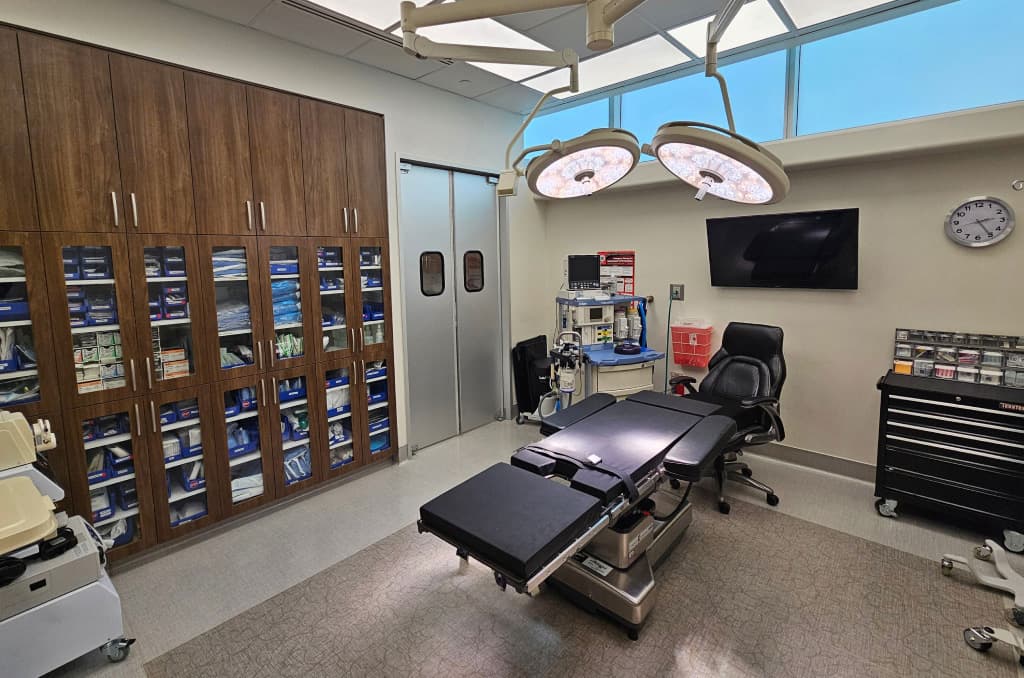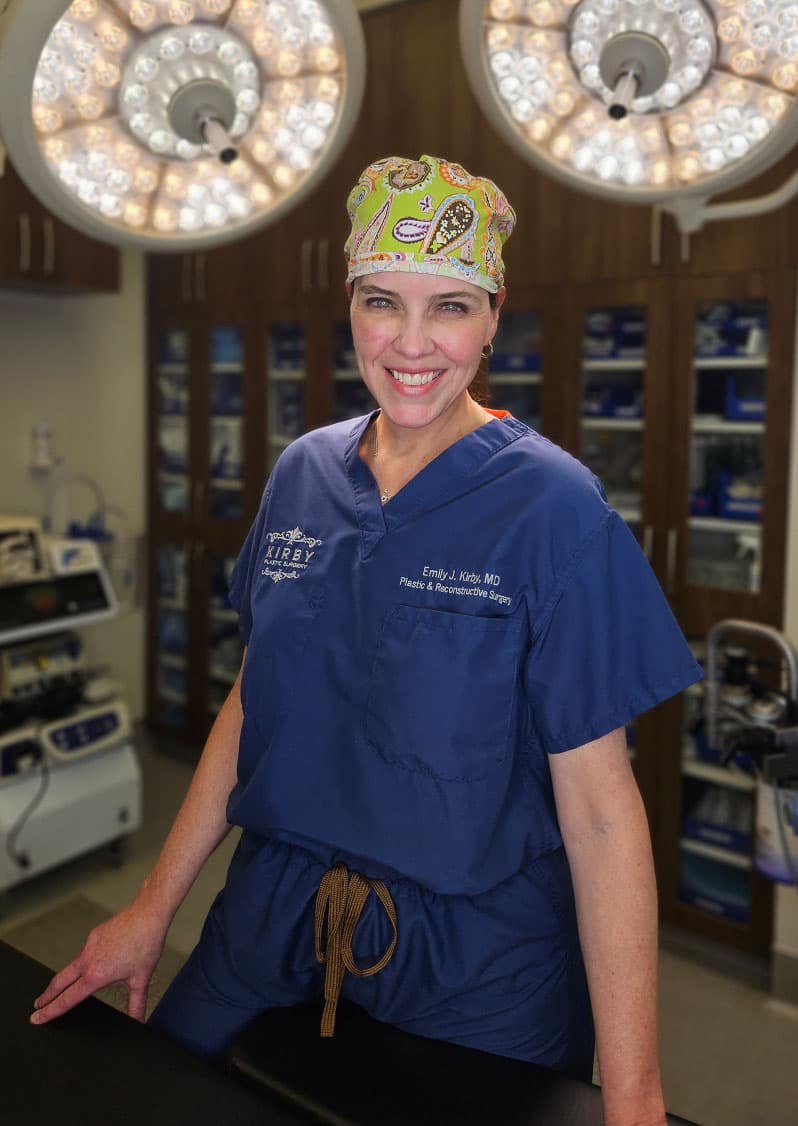Breast Implant Removal Fort Worth

Throughout life, we’re constantly changing. The clothes we wear, the music we listen to, and our favorite hobbies evolve, and what we once loved may no longer have a place in our lives. Breast implants are no different—and if you are no longer happy with yours, having them removed may be the right choice for you. If you wish to remove your implants in Fort Worth, Board Certified Plastic Surgeon Dr. Emily J. Kirby can help.
Should I have my breast implants removed?
Ultimately, this decision is yours alone. If your breast implants no longer fit in with your lifestyle or aesthetic preferences, having them removed is a choice you may wish to make—your personal happiness, comfort, and confidence should be your top priority.
There are a number of reasons women choose to have their breast implants removed, including:
Complications with breast implants
Breast implants are not meant to be lifetime devices—and after around 10 years, the risk of implant-related complications increases. Older implants have a slightly higher risk of rupture, leakage, and capsular contracture, so you may opt to have your implants removed to address an issue or to proactively minimize your risk.
Often, patients who have experienced a complication choose to have their implants replaced with newer generation styles for a refreshed look, but if you prefer to restore your natural breast after removal, that is entirely up to you.
Change in lifestyle or aesthetic preference
It’s normal for your sense of style to change over the years—and some women find that their larger breasts no longer work for them. Perhaps your bust is now getting in the way of your newfound athletic lifestyle, or you no longer feel comfortable with the way your breasts look in your clothing.
Put simply, if you no longer want your breast implants, it is your prerogative to have them removed.
Female Plastic Surgeon Fort Worth
- Board-Certified Plastic Surgeon
- Over 14 years of experience in private practice
- Founder and Medical Director of Kirby Plastic Surgery, Kalos Medical Spa, and City Surgery Center—a Quad A-accredited, state-of-the-art facility located onsite
- Specialist in breast surgery and body contouring, including postpartum
- Castle Connolly Top Doctor since 2019
- First female Chief of Plastic Surgery, Texas Health Resources Harris Methodist Hospital
Safety concerns (BII or BIA-ALCL)
With growing media attention on breast implant-related health risks, like BIA-ALCL and “Breast Implant Illness” (BII), some women are choosing breast implant removal to prevent the possibility of BII or in attempt to reduce issues with other associated inflammatory diseases. Similarly, some patients are worried by the news of the BIOCELL® textured breast implant recall.
While the FDA does not recommend having your breast implants removed preventatively, since the risk of developing BIA-ALCL is very low, it is your body and you can choose to have your breast implants removed if you want to. Just make sure that you are working with an experienced, Board Certified Plastic Surgeon and that you have the green light to move forward with surgery safely.
Anesthesia from board-certified MDs or DOs only.
Custom ERAS protocols for each patient.
Instant ultrasound results, in-office.
Relaxing, private, & Quad A-accredited.
I’d like my implants removed, what’s next?
Whatever the reason, if you have made the decision to undergo breast implant removal, Dr. Kirby explains what will happen next in this video:
Your breast implant removal consultation
Your consultation takes about one hour. You’ll spend most of that time with Dr. Kirby discussing your goals, concerns, and questions, and learning how Dr. Kirby tailors the procedure to address each of these. You’ll also get to meet our nursing staff who will take your vitals and review your medical history, and our patient care coordinator will schedule your procedure and help guide you through the process from start to finish.
“Dr. Kirby is, hands down, one of the best doctors I’ve ever seen. Not only does she take the time to discuss everything with you, in detail, but she also listens to you. She is an amazing surgeon and earned so many awards and accolades, but you would never know that upon meeting her because her humility speaks louder than all of that…she made me feel comfortable from the moment she walked into the room. Because of her, I feel like myself again, and there aren’t adequate thank you’s for that. Trust me when I say, you won’t find a better doctor in DFW.”
What is breast implant removal surgery like?
Depending on the age and type of your breast implants, breast implant removal is typically a straightforward procedure with few risks. Your procedure is typically performed under general anesthesia and takes anywhere from 30 minutes to two hours to complete if the capsule is also removed with the implants.
If possible, Dr. Kirby will use your existing scar to make a new incision, typically located in the natural fold under the breast.
Through this incision, Dr. Kirby opens the capsule of scar tissue that naturally surrounds the implant so she can gain access to the implant. Alternatively, if the capsule is to be removed at the same time (capsulectomy), the capsule is ideally surrounded, left intact, containing the implant, and is removed together with the implant. This decision will be based largely on how best to achieve an optimal result for you and your safety.
Breast implant removal recovery
Most patients find recovery after breast implant removal to be much more comfortable than their primary breast augmentation. You’ll be able to return home the same day after surgery, though you will need a little help around the house for that first night.
Better Recovery

You may be required to wear drains for your initial healing to avoid excess fluid buildup and swelling. Similarly, you might also be asked to wrap your chest for around a week to ensure proper compression of the healing tissues.
The majority of our patients are able to go back to work after just a few days, once they’ve stopped taking prescription pain medication. Non-strenuous activities can also be resumed at this time, but you’ll still need to avoid the gym, heavy lifting, and excessive activity for a few weeks.
What can I expect plastic surgery recovery to be like?
Dr. Kirby’s goal is to get you back on your feet as soon as possible! In this video, she explains what you can expect recovery to be like after your plastic surgery procedure.
What is an en bloc capsulectomy?
An en bloc capsulectomy is when the entire capsule around the implant, along with the breast implant itself, are removed as one solid piece. Dr. Kirby makes an incision in the inframammary fold and then carefully separates the capsule from surrounding tissues before removing the implant and capsule together.
While this term has been popping up more frequently in conjunction with breast implant concerns, it is not always a necessary procedure for most patients—and, in fact, has the potential to add unnecessary complications to surgery.
An en bloc capsulectomy requires a longer incision to allow access to the full capsule. The procedure takes longer and is more complex, which, in turn, increases the risk of complications. Additionally, sometimes the capsule or breast tissue are too delicate to perform the procedure and pieces of the capsule may not be able to be removed safely.
In cases of suspected or confirmed BIA-ALCL, an en bloc capsulectomy is the best choice for ensuring all cancerous tissue has been removed. For traditional breast implant removal, however, a partial or total capsulectomy (where the capsule is removed entirely after the implant has been removed) is usually the best choice. Dr. Kirby will discuss your options with you and make a surgical recommendation based on your personal circumstances.

City Surgery Center
Our on-site, Quad A-accredited surgical suite
Instead of heading to a hospital or other public surgical facility for your procedure, you can enjoy the privacy and luxury of our on-site operating room, designed to facilitate safe, top-quality care in a spa-like setting. Quad A-accreditation is the gold standard and meets or exceeds hospital standards.
What will my breasts look like after breast implant removal?
Because every woman and her breasts are different, there is no definitive answer here. The final look of your breasts can be impacted by your natural anatomy, size of your breast implants, and age. Because of Dr. Kirby’s care and consideration of all of these factors during your explantation procedure, the majority of our patients are left with a pleasing breast shape that they’re happy with.
It’s normal to notice a loss of fullness in the upper breast where the implant was. However, unless your breast implants were very large or your skin is very lax, this is usually not noticeable or problematic for patients. If needed, Dr. Kirby can also perform a breast lift to address excess skin, though she may recommend waiting at least 6 months before that follow-up procedure for safety reasons.
Real patient images from Board-Certified Plastic Surgeon Dr. Emily Kirby
*Individual results may vary.
Dr. Emily Kirby ensures that every plastic surgery patient receives Enhanced Recovery After Surgery (ERAS) care to optimize recovery time and minimize pain. Dr. Kirby uses innovative pain reduction techniques, such as numbing anesthetics and small doses of different types of medications, to reduce discomfort from many angles.
“Dr. Kirby has created the most amazing experience. She is thorough and intuitive, sincerely cares about the work she does and perfectly marries listening to what you want and what science says.”
—Actual patient
- Key Benefits
- Glossary
- Restores your natural breast size
- Offers the opportunity for natural breast rejuvenation with a breast lift or fat transfer to the breasts
- Offers peace of mind for patients concerned about implant-related complications
- Systemic Symptoms Associated with Breast Implants (SSBI); may be referred to as Breast Implant Illness (BII): A term used to describe a variety of symptoms believed to be directly related to silicone or saline breast implants, which can include fatigue, chest pain, hair loss, headaches, etc., leading some patients to decide to remove their breast implants.
- Breast Implant Removal: A surgical procedure to remove breast implants after a previous breast augmentation or reconstruction surgery.
- Capsular Contracture: A complication of breast implants where the scar tissue that naturally forms around the implant thickens, tightens, and squeezes the implant, sometimes causing pain or distortion of the breast shape, which can necessitate implant removal.
- En Bloc: This is a term used when referring to a cancer operation, describing removal of a cancer and the surrounding tissues in one piece. It is often incorrectly used to describe breast implant removal with capsulectomy, where the appropriate term would be a complete or complete intact capsulectomy.
- Explant Surgery: Another term for breast implant removal surgery.
- General Anesthesia: Medication administered to induce sleep and relaxation during breast implant removal surgery.
- Implant Deflation/Rupture: A condition where a saline or silicone implant leaks or breaks, which requires implant removal or replacement.
- Local Anesthesia: Medication administered to prevent pain during surgery by numbing a small area; it may be used in combination with sedation during breast implant removal to minimize discomfort if preferable over general anesthesia.
- Mammography: A diagnostic procedure, or X-ray imaging of the breast, which is used for surveillance of breast tissue. Occasionally, a mammogram can reveal implant irregularities, but ultrasound and MRI are better designed to view implants.
- Recovery Time: The period after surgery during which the patient heals. This includes time for swelling and bruising to subside after breast implant removal, and for the patient to gradually return to normal activities, typically ranging from a few days to several weeks. Recovery can be streamlined, but not rushed.
- Scar Tissue Capsule: The naturally forming scar tissue that surrounds a breast implant, which is usually thin and strong, but which can become problematic in cases of capsular contracture; may be removed during explant surgery.
- Total Capsulectomy: A surgical procedure that removes the entire scar tissue capsule surrounding an implant.
Healing your incisions and scar care after surgery
Proper incision care is essential to a smooth recovery. In this video, Dr. Kirby shares what you need to know about caring for your incisions as you heal from your plastic surgery procedure.
References »
Coroneos CJ, Selber JC, Offodile AC 2nd, Butler CE, Clemens MW. US FDA Breast Implant Postapproval Studies: Long-term Outcomes in 99,993 Patients. Annals of Surgery. 2019 Jan;269(1):30-36. doi: 10.1097/SLA.0000000000002990.
Swezey E, Shikhman R, Moufarrege R. Breast Implant Rupture. 2023 Jan 16. In: StatPearls [Internet]. Treasure Island (FL): StatPearls Publishing; 2023 Jan–.
Hadad E, Sualhi I, Legarda C, Seligman Y, Sorkin A, Dor O, Menashe S, Heller L, Wiser I. Silicone breast implant rupture is more prevalent in the dominant limb side: A retrospective cohort study. Journal of Plastic, Reconstructive & Aesthetic Surgery. 2023 May;80:126-132. doi: 10.1016/j.bjps.2023.02.016.
Guimier E, Carson L, David B, Lambert JM, Heery E, Malcolm RK. Pharmacological Approaches for the Prevention of Breast Implant Capsular Contracture. Journal of Surgical Research. 2022 Dec;280:129-150. doi: 10.1016/j.jss.2022.06.073.
Quinlan CS, Lynham R, Kelly JL. Risk Factor Analysis for Capsular Contracture, Malposition, and Late Seroma in Subjects Receiving Natrelle 410 Form-Stable Silicone Breast Implants. Plast Reconstr Surg. 2017 Sep;140(3):499e. doi: 10.1097/PRS.0000000000003613.
Habib PM, Serena T, Derosa A. Breast Implant Illness: A Case Series. Cureus. 2022 Mar 31;14(3):e23680. doi: 10.7759/cureus.23680.
Lee M, Ponraja G, McLeod K, Chong S. Breast Implant Illness: A Biofilm Hypothesis. Plastic and Reconstructive Surgery Global Open. 2020 Apr 30;8(4):e2755. doi: 10.1097/GOX.0000000000002755.
Bewtra C, Gharde P. Current Understanding of Breast Implant-Associated Anaplastic Large Cell Lymphoma. Cureus. 2022 Oct 20;14(10):e30516. doi: 10.7759/cureus.30516.
Swanson E. Evaluating the Necessity of Capsulectomy in Cases of Textured Breast Implant Replacement. Annals of Plastic Surgery. 2020 Dec;85(6):691-698. doi: 10.1097/SAP.0000000000002301.
Questions and Answers about Breast Implant-Associated Anaplastic Large Cell Lymphoma (BIA-ALCL). U.S. Food & Drug Administration.
W. Grant Stevens, David A. Stoker, Mark E. Freeman, Suzanne M. Quardt, Elliot M. Hirsch, Mastopexy Revisited: A Review of 150 Consecutive Cases for Complication and Revision Rates, Aesthetic Surgery Journal, Volume 27, Issue 2, March 2007, Pages 150–154, https://doi.org/10.1016/j.asj.2006.12.014
Pferdehirt R, Nahabedian MY. Finesse in Mastopexy and Augmentation Mastopexy. Plastic and Reconstructive Surgery. 2021 Sep 1;148(3):451e-461e. doi: 10.1097/PRS.0000000000008303.
- Discuss your goals and concerns
- Obtain a unique female perspective
- Review convenient financing options
- call or TEXT (817) 292-4200 or contact us online today!
Area Served:

Medically reviewed by Dr. Emily J. Kirby — Updated on May 20, 2025
